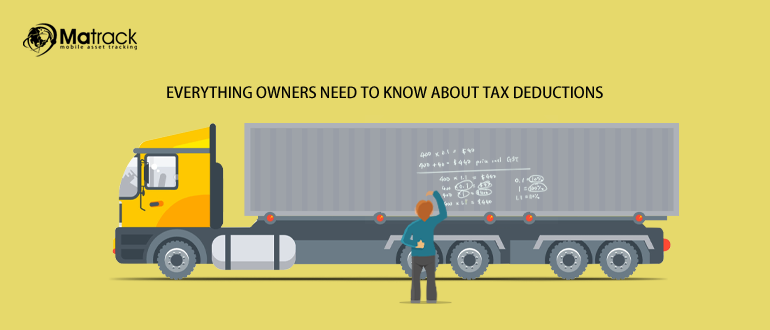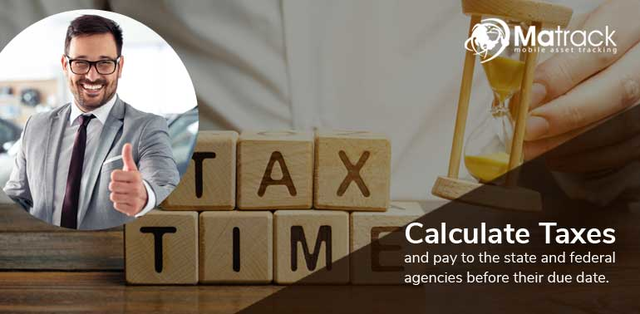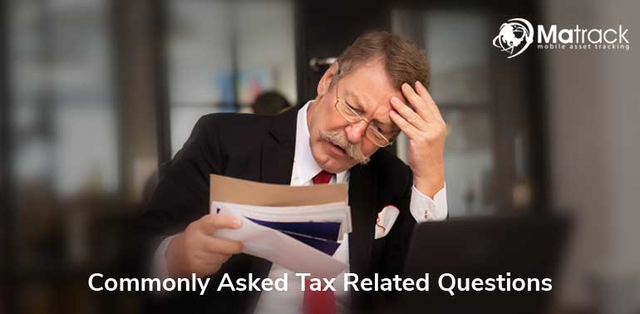Everything Owners Need To Know About Tax Deductions

Remember the time as school kids that we wasted in leisure and play and bit our nails off just one day before our tests hoping we had only prepared a little earlier? Those curses and self-deteriorating comments we passed at ourselves back then for being the procrastinator and knowing we would be much better students had we been more organized, is a synonymous feeling we face while filling for taxes as grownups.
Filing for taxes are definitely not a very fun thing to do as it eats up a whole lot of time and demands a lot of concentration and attention in order to get everything right.

If taxes are the least of your concern, then you probably are on the employee end, having them pre calculated and deducted directly from your monthly paycheque. However, this is unfortunately not the case with the owners of a business and this factor applies to owner operators of the trucking business as well. Hence it is extremely important to study this challenging procedure in detail.
In the trucking business, an owner operator is solely responsible for paying off taxes relevant to his firm, by himself. The owner needs to calculate taxes and see that they are paid to the state and federal agencies before their due date, in order to avoid penalties and fines for the same.
An owner operator is required to pay his taxes quarterly or yearly, quarterly being the more convenient manner. These taxes are supposed to be about 20 to 30 percent of the net income of that quarter or year. If these payments are done at regular intervals, the owner will save himself of a fine at the time of year ending (generally during the month of April). It is important to pay taxes, quarterly, if you owe at least $1,000 in taxes after subtracting withholding and credits. Owners also hold the advantage of tax deductions while running a business. Let us take a look at what tax deductions actually are.
Owner Operator Tax Deductions
As an owner operator of the trucking industry, you have ample of tax deduction benefits. These deduction benefits can be used to keep the money rolling and the cash flow on a constant up rise. These deductions include absolutely everything that comes under your company expenses. Owners are often oblivious to this fact. Most owners do not fully know the factors that come under this rule and the list of things that can be claimed under tax deductions for their company. The tax deduction rule has a lot of benefits when filing for tax returns and it is therefore a vital piece of information relevant to tax filing.
As the tax deduction rule includes all company expenses, it is extremely important that you save or keep a record of all the company expense receipts of the accounting year or quarter year, depending on the tax term you choose. Maintaining a file of these receipts could prove to be handy.
Before we get into the nitty gritty of tax deductions, it is important to first understand the need to pay your taxes on time and take a look at what owner operator tax payments include.
Why is it important to pay your taxes time to time?
This saves money and unnecessary trouble. The government charges a 3 percent interest rate on the tax for late payments. Hence if you don’t pay your taxes on time, it would only be a burden of extra money to pay and additional paperwork to cope with. It would also be considered as a legal offense if you don’t pay your taxes at all, thus taking away a lump sum amount from you at the time of the yearly audit.
Types of Taxes
There are two types of taxes that are applicable to the owner operator of the trucking business. They are:
Self-Employment Tax: Medical taxes and social security taxes rhyme with self-employment taxes. This tax is actually a combination of medical tax (2.9 percent) and social security tax (12.4 percent). Therefore, the self-employment tax amounts to 15.3 percent.
Federal Income Tax and State Income Tax: As an employee’s income tax is deducted from his paycheque, an owner operator on the other hand needs to take responsibility of estimating and paying this tax. The federal income tax and state income tax is generally calculated on the basis of tax return.
Types of Tax Forms
There are two types of tax forms; W2 and 1099. Often, W2 is a tax form issued to company employees. This is an indication that your taxes have already been deducted from your paycheque.
On the other hand, a self-employed individual who is also classified as the owner operator would have to fill in the 1099 form. This is because he would be responsible for filing for his own taxes and paying them off himself.
Schedule C
Schedule C is a form that reports the net income of the firm relevant to the 1099 form. This comprises of all other incomes as well that are incurred through truck driving by the firm.
Tax Facts and Guidelines
- The IRS permits tax payments on the basis of your previous year records and data.
- Every state has its own income tax website that should be referred to while paying taxes. Payment vouchers and addresses can be obtained from the state website itself. You could also find payment vouchers and addresses on the IRS.gov. website.
- You can pay your federal income tax and state income taxes online. For federal income taxes you could visit – eftps.gov. website, whereas for state income tax you could visit your state’s department of revenue website and follow guidelines on the site for the payment.
- To make the federal income tax and state income tax payment together, you could visit www.officialpayments.com. The website however charges an extra 2 percent of your payment as service fee.
- It is absolutely fine to pay your taxes on a yearly basis. However, that is more time and energy consuming. Yearly tax paying simply accounts for more paperwork and more data to fetch from. This can add to confusion and hence the quarterly method of paying taxes is proven to be simpler and faster.
- Set aside money from each pay cheque to avoid unnecessary hassles like money shortage at the time of tax payment.
- One of the most important factors while filing for tax is record keeping. Keep a proper record of your data, tax documents, paperwork and other necessary documentation at the time of filing for taxes. Maintain a file of documentation for a smoother procedure.
You never want to annoy an IRS official

While most owner operators in the trucking business are used to filing for taxes on their own each year their experience tends to get them a little overconfident about never goofing up. However, with the “almost there” and “just managing somehow” attitude, there is a thick chance that you might just miss out on an important chunk while filing for taxes. No, you are not to blame. It is actually the ever changing tax rules that get you all confused and worked up last minute.
Tax is an elaborate topic with many aspects and loop holes that are invented and scraped every now and then. It is no wonder that owner operators are bound to miss out on a few of the constantly changing rules. Nevertheless, it is no use playing the blame game last minute as it would eventually land you in trouble. It is therefore very important to have yourself updated with the latest change in rules before you file for taxes, be it quarterly or yearly. Maintain a file of documentation would also smooth out regular audits thus avoiding clashes and confusion of any sort.
Understand that the tax deduction procedure is way different than that of an employee’s. This is extremely crucial if you are new to the business as this is one of the most common reasons of error while filing for tax. Here are a few questions that may help clear out some of the confusion.
Commonly Asked Tax Related Questions

Owner operators of the trucking industry are often confused with a lot of aspects related to tax payment. As there is information readily available on their websites, there are still a few questions that may not have clear answers. Given below are a few questions that are commonly asked while paying taxes.
Q. If I have a contract labourer, what are the forms that I would need to fill? (This person could be a team driver per say)
A. in this case you would need to run an employee through the payroll and hand them a W2 form at the end of the year. On the other hand, if you have a contractor labourer, you would have to hand them a 1099- MISC.
Q. What if I have not paid my quarterly taxes this year?
A. If you have crossed the due date then you will be charged a 3 percent fine on the tax amount by the IRS.
Q. Is it necessary to file different tax returns for company driver earnings and owner operator earnings?
A. You don’t have to. If you are the only proprietor in the company then you will need to fill in the 1040 form. This form comprises of a Schedule C that entails all your business expenses and earnings.
Questions Related to Family and Taxes
Q. Is it ok to claim a parent as a dependent on your taxes?
A. There is a provision for this factor by the IRS. However, you need to meet more than half of your parent’s support cost to fit in this criterion. This means, if you cover 51 percent or more of the parent’s support cost, only then you are eligible to file the claim for your parent as a dependent. This person need not only be your parent, he can be a grandparent on in-law as well. The costs you need to cover include food, clothing, shelter, medical services, equipment expenses, etc.
Q. Do spouses need to file their tax returns separately?
A. Now that is a choice you can make. You have two forms to choose from; marriage filing jointly and marriage filing separately. You need to see which one reaps more benefits for you and file for tax payment accordingly.
Q. How much of my or my spouse’s social security income falls under tax payment or is taxable?
A. The social security income tax depends on your marital status as well as your total income. For federal income tax return, your income should be between $25,000 and $34,000 respectively. In this case, your income tax would amount to about 50 percent of your benefits.
In case your income is above $ 34,000, about 85 percent of your benefits fall under the tax payment rule. In case you are married and file in for joint returns, you and your spouse together need to have an income between $32,000 and $44,000. If it is so, your taxes would amount to about 50 percent of your benefits.
Q. Can a dependent be claimed on quarterly estimated taxes?
A. No. Dependents should only be claimed on yearly tax returns.
Paying taxes is not the sole responsibility of an owner operator of the trucking industry. It is important that he also checks for tax deductions and uses that rule for optimum tax benefits as well. Tax deductions reduce the burden of heavy taxes and also unnecessary taxes that owners often pay due to lack of information. There are also many available deductions that are often overlooked by owners that lead to extra tax payments. An owner operator should be well updated with the tax deduction advantages while filing for taxes so that he can fully avail its benefits and avoid extra loss of money.
Owner operators of the trucking industry have an array of deduction benefits on tax payment. However, there are many aspects such as subcontracting rules, rules for partnerships in business, etc. that need to be taken a close look at before filing for tax deductions.
As part of the trucking industry, you could learn gps and fleet management better with a Matrack gps truck tracking device. Please refer to the Advantages of Tax deduction for owners, blog for detailed information on the same.


